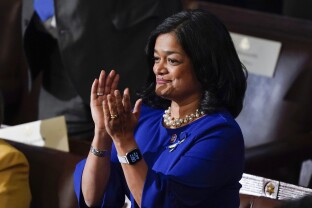Less than a month ago, many progressives weren’t sure Kamala Harris would get the nomination if Joe Biden stepped aside — and they certainly didn’t believe she would pick a vice presidential nominee who would energize the Democratic base.
Now, less than two weeks before the Democratic National Convention, progressives are taking a victory lap. Harris ascended to the top of the ticket with almost zero drama. She picked someone who progressives not only find agreeable but inspiring. And, perhaps most importantly, the entire Democratic Party is fired up.
Progressives, in short, are breathing a sigh of relief. And they’re hoping the lesson everyone draws from the experience is that Democrats should listen more to their base.
Rep. Mark Pocan called Walz a “great guy” on X.
“Real deal authentic midwestern values. Gets big things done,” he wrote, going on to make a direct jab at Sen. JD Vance, Donald Trump’s running mate. “Going to make JD Vance look like a used couch salesman.”
Congressional Progressive Caucus Chair Pramila Jayapal echoed a similar sentiment, writing on X that a Harris-Walz ticket would “help cement a strong working class agenda” that “speaks to voters across America.”
“I know the Harris-Walz agenda will continue to mobilize voters across the country to victory in November with a bold, popular vision that focuses on the pressing economic needs of poor and working people,” she wrote.
Progressives particularly feel emboldened by Harris picking Walz for her vice presidential candidate. While Walz campaigned and served as a moderate Democrat in Congress, he’s been a proven ally of the left as governor of Minnesota, signing a number of progressive policies into state law.
“Democrats now understand they cannot win against Trumpism without pushing policies that resonate with working-class voters in the Midwest and beyond,” Joseph Geevarghese, executive director of the progressive group Our Revolution, told NOTUS.
“He’s an excellent pick, and it gives progressives hope that a President Harris will listen to us and replicate a working-class agenda similar to what Walz did as Minnesota governor,” Geevarghese said.
But as progressives bask in Walz’s addition to the ticket, the movement was dealt another blow Tuesday evening when prosecutor Wesley Bell handily defeated Rep. Cori Bush in Missouri’s Democratic primaries. Bush is the second member of the so-called “squad” to lose her seat this election year; Rep. Jamaal Bowman was also defeated in June.
Both Bowman and Bush faced historic spending against them, fueled by the American Israel Public Affairs Committee, which pumped over $8 million to Bell’s campaign as part of a nationwide effort to oust lawmakers critical of Israel. Like with Bowman, Bush’s opponents highlighted her vote against Biden’s infrastructure bill (their votes were not out of opposition to the law itself, but because the bipartisan legislation left out a host of Biden’s policy priorities progressives had championed, some of which were later included in the Inflation Reduction Act).
Still, the success of these primary challenges puts progressives in a difficult position going into the next Congress. While they may see an ally in Walz at the top of the ticket, some of their biggest names have been proven susceptible to big-money campaigns.
“There’s an enormous amount of influence of big money in politics,” Rep. Alexandria Ocasio-Cortez said on CBS Wednesday morning about Bush’s and Bowman’s losses. “That, to me, speaks to the corrupting role of our current campaign finance system and the fact that it is very hard to be a working-class American that gets elected to office and stays in office. Those defeats speak to the more urgent need for us to continue to advocate on these issues.”
For now, however, progressives are focusing on the positive. As governor, Walz signed expansive social welfare programs into law, increased protections for workers, codified abortion rights into state law, protected transgender rights, granted driver’s licenses to undocumented immigrants, passed a marijuana legalization bill and installed new gun safety laws.
As Jara Butler, chief impact officer at progressive grassroots organization Supermajority, put it, Walz could “uplift the movement.”
“Having progressive voices at the table, voices with conviction and a commitment to working-class folks, all working-class folk, is critical to achieving policy wins that can and will change lives for the better,” she said. “As a former teacher who took a nontraditional path in my education, I really like seeing diversity of experiences represented at the highest levels.”
One Democratic strategist with close ties to congressional Democrats described Walz’s approach to governing as “a brand of prairie populism.”
“Bernie occupies a space further to the left, with a fully formed policy agenda. Walz represented a swing district and has governed as a progressive but one who has to deliver,” they said, noting that their assessment wasn’t a slight at Sanders. “They are just different.”
In an effusive endorsement, the CPC PAC described Walz as a leader who will “strengthen and expand our movement.”
Walz “has proven that progressive policies like paid family and medical leave, universal background checks, investments in clean energy, an expanded Child Tax Credit, and lowering health care costs are not only popular — they’re possible,” read a statement from the PAC.
Rep. Troy Carter, a CPC member, put it more bluntly.
“Governor Walz is a great pick for America!” he texted NOTUS.
—
Tinashe Chingarande is a NOTUS reporter and an Allbritton Journalism Institute fellow.
Sign in
Log into your free account with your email. Don’t have one?
Check your email for a one-time code.
We sent a 4-digit code to . Enter the pin to confirm your account.
New code will be available in 1:00
Let’s try this again.
We encountered an error with the passcode sent to . Please reenter your email.


